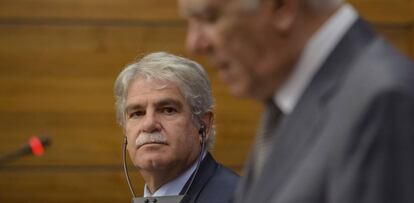Madrid improvises foreign strategy in fight against Catalan propaganda
The Foreign Ministry has sent six statements to Spain’s ambassadors since September

“Alarmed.” This is how several Spanish diplomats admit to feeling in the face of the boom in distribution of false messages spread by the Catalan separatists and faced with the Spanish executive’s late and improvised strategy to deal with the crisis in the region. The prime minister’s office has hardly a role in this dispute and the Foreign Ministry has distributed six documents since late September with very basic arguments and ideas regarding the conflict to its embassies. Minister Alfonso Dastis is almost the only person facing the international media.

In the very heart of Spanish Prime Minister Mariano Rajoy’s government, it is recognized that the battle to win over international coverage on Catalonia has already been lost, and for many reasons, but mainly because it’s a battle that’s barely been fought.
Some diplomats believe the Spanish state has failed in the international media “out of laziness and a lack of a coordinated message”
What some Spanish diplomats stationed abroad consider “alarming” is that “so many years have gone by without quickly and categorically explaining and opposing the Catalan separatists’ claims as a totally undemocratic objective and [highlighting] that the Spanish state is as democratic as any other country in our region.” The prime minister, many of his ministers and other senior central officials in the administration have not taken on that task “out of laziness or the lack of an articulated and coordinated message,” according to some diplomats consulted. And when they did try, in late September, right before the Catalan referendum on October 1, it was already too late.
The government has argued it has more important things to busy itself with. It is clear that the Catalan regional government spends much more time on this task and uses its media resources more effectively. The prime minister’s office has hardly done anything to build a common strategy against the narrative and falsehoods imposed by the Catalan separatists.
International correspondents themselves admit that when they come to Spain they have serious problems finding a government official to give them a direct version of the facts, let alone on a live broadcast and in a language other than Spanish. The exact opposite is true of several of the top representatives of the regional government of Catalonia.
The Foreign Ministry gave their ambassadors the order to encourage direct meetings with journalists
However, since late September, the Foreign Affairs Ministry has stepped up its contacts with international media and Spanish embassies. Six fact sheets have been sent, in Spanish and English, with some basic ideas for the ambassadors to use in an interview. The Foreign Ministry gave its ambassadors the order to encourage direct meetings, with or without publication as the final end result, with journalists. In the first two weeks of October, since receiving those instructions there have been 87 interviews on radio and television, and in printed media, nine letters to the editor of various media outlets requesting clarifications and corrections, 91 off-the-record meetings, and about 500 tweets from 60 embassies.
Foreign Minister Alfonso Dastis, who is almost exclusively appearing in international media, has offered 12 interviews on foreign television and radio, held three press conferences, and held five private meetings with media outlets including The Times, The Economist, The Guardian, The Financial Times, and Der Spiegel.
In the documents sent to the embassies, which then end up being distributed by the consulates and other services, the conflict in Catalonia is exposed in an often technical or “bureaucratic” way. On Tuesday, after the arrest of the ANC and Òmnium leaders, the documents described what happened, what the crime of sedition is, the facts that were investigated and concluded that “in Spain there is separation of powers, respect for judicial decisions and that bypassing the law has consequences.” In a previous document, after King Felipe VI’s speech, it spoke of a “calm, transparent and firm” performance of the executive when facing the anti-democratic “farce” of the disorganized referendum on October 1.
English version by Debora Almeida.
Tu suscripción se está usando en otro dispositivo
¿Quieres añadir otro usuario a tu suscripción?
Si continúas leyendo en este dispositivo, no se podrá leer en el otro.
FlechaTu suscripción se está usando en otro dispositivo y solo puedes acceder a EL PAÍS desde un dispositivo a la vez.
Si quieres compartir tu cuenta, cambia tu suscripción a la modalidad Premium, así podrás añadir otro usuario. Cada uno accederá con su propia cuenta de email, lo que os permitirá personalizar vuestra experiencia en EL PAÍS.
¿Tienes una suscripción de empresa? Accede aquí para contratar más cuentas.
En el caso de no saber quién está usando tu cuenta, te recomendamos cambiar tu contraseña aquí.
Si decides continuar compartiendo tu cuenta, este mensaje se mostrará en tu dispositivo y en el de la otra persona que está usando tu cuenta de forma indefinida, afectando a tu experiencia de lectura. Puedes consultar aquí los términos y condiciones de la suscripción digital.








































